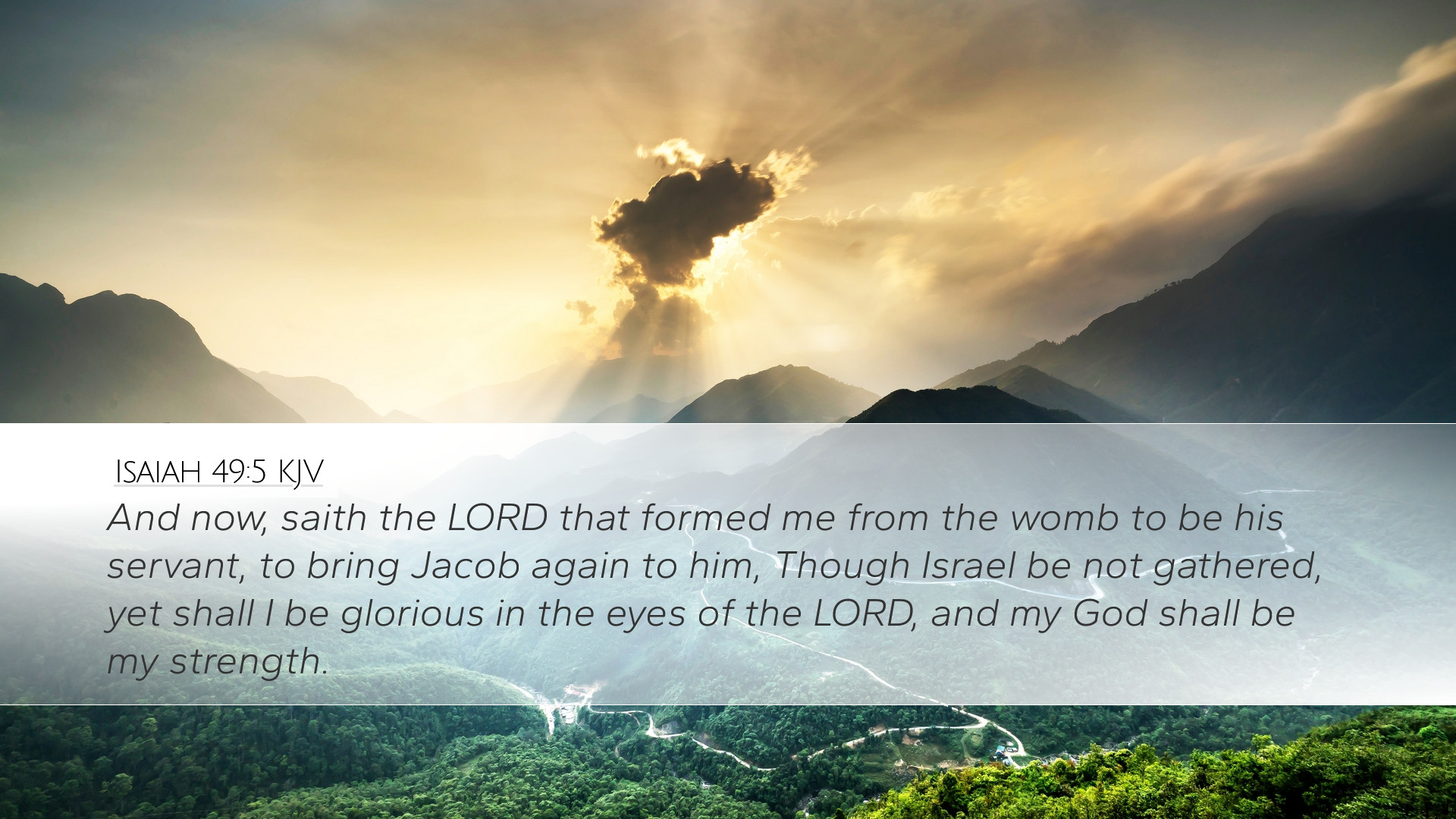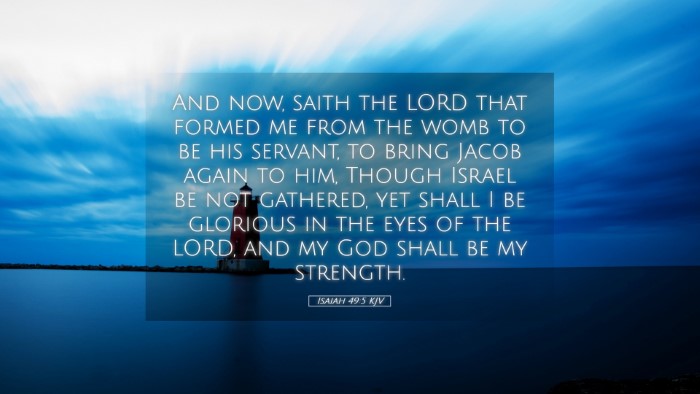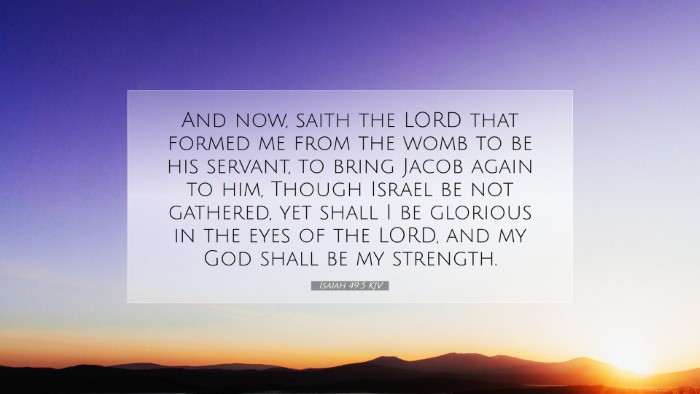Commentary on Isaiah 49:5
Verse: "And now, saith the Lord that formed me from the womb to be his servant, to bring Jacob again to him, though Israel be not gathered, yet shall I be glorious in the eyes of the Lord, and my God shall be my strength."
Introduction
Isaiah 49:5 is a profound statement regarding the calling of the servant of the Lord. This verse encapsulates the mission to restore Israel, the challenges faced, and the assurance of divine strength and glory. The interpretations offered by public domain commentators like Matthew Henry, Albert Barnes, and Adam Clarke provide insights into the theological implications and historical context of this passage.
Contextual Overview
This verse is part of the "Servant Songs" found in Isaiah, which highlight the identity and mission of the servant, often interpreted as the Messiah and, by extension, the Church that follows His teachings. The passage emerges amid a backdrop of exile and the longing for restoration, reflecting both a message of hope and a revelation of God's redemptive purpose.
Insights from Matthew Henry
Henry emphasizes the importance of divine calling in this verse. He notes that:
- Formation in the Womb: The phrase "formed me from the womb" indicates that the servant's identity and mission were established by God before birth, highlighting God's sovereign choice in appointing His servants.
- Servanthood: The servant's role is underscored as "his servant," positioning the individual not merely as a leader but in a humble role dedicated to God's glory.
- Restoration of Jacob: Henry sees the mission directed toward the people of Israel ("bringing Jacob again"). Here, he identifies the servant's task not only as a physical return but as a spiritual reclamation.
- Divine Assurance: The declaration that the servant will be “glorious” and that “my God shall be my strength” reflects the servant's reliance on God in undertaking a seemingly impossible mission.
Insights from Albert Barnes
Barnes offers a critical examination of the implications of this verse:
- Universal Application: He suggests that while the immediate audience is Israel, the message extends globally, indicating a universal scope for the servant’s mission.
- Contradiction of Perception: Barnes notes a tension in the text, where the servant is called to glorify God even when “Israel be not gathered.” This points to the challenges faced by the servant and the desolation of the people.
- Strength Through Weakness: His explication on “my God shall be my strength” underscores a key theological tenet: true strength is found in dependence on God, a theme resonant throughout scripture.
- Subservience to Divine Will: The concept of servanthood as an honor rather than a humiliation is a prominent feature of Barnes's commentary, aligning with Christ's own conclusions on leadership in Mark 10:43-45.
Insights from Adam Clarke
Clarke's commentary delves into linguistic and cultural dimensions:
- Hebrew Roots: He expounds on the Hebrew term for "formed," relating it to the creative authority of God in setting forth prophecy and the inherent identity of the servant.
- Importance of Gathering: Clarke draws attention to the relational aspect intrinsic to “bringing Jacob again,” highlighting the importance of community among God’s people and their collective identity.
- Glory in Adversity: The notion that the servant will be “glorious” even in the face of failure speaks to the redemptive hope central to the Gospel, encouraging believers to find purpose amid challenges.
- Role of Prophecy and Fulfillment: He also discusses how this passage connects to the New Testament understanding of Christ as the ultimate fulfillment of prophecy, especially in relation to Israel and the Gentiles.
Theological Reflections
In synthesizing these commentaries, several theological themes arise:
- God’s Sovereignty: The intentional creation and calling of the servant by God underscore the overarching sovereignty that governs human history, enhancing the assurance believers can find in their own divine callings.
- Servanthood as Identity: The designation of the servant frames a biblical understanding of leadership that prioritizes humility, sacrifice, and a commitment to serving God above personal ambition.
- Hope in Despair: Given the historical context of exile, this verse serves as a reminder of God’s enduring promise to restore and redeem His people, a theme that continues through to the New Testament promise of redemption through Christ.
- Strength in Weakness: The juxtaposition of servitude and divine strength invites believers to navigate their struggles with the assurance that God equips and empowers them to fulfill His purposes.
Conclusion
Isaiah 49:5 stands as a beacon of hope and a model of authentic servanthood. It challenges pastors, students, and scholars to reflect on their own calling and the nature of their service to God and His people. Building upon the insights gleaned from esteemed commentators, this verse invites a deeper understanding of God’s plan for restoration and equips believers to embrace their identity as God’s servants in a world eager for redemption.


